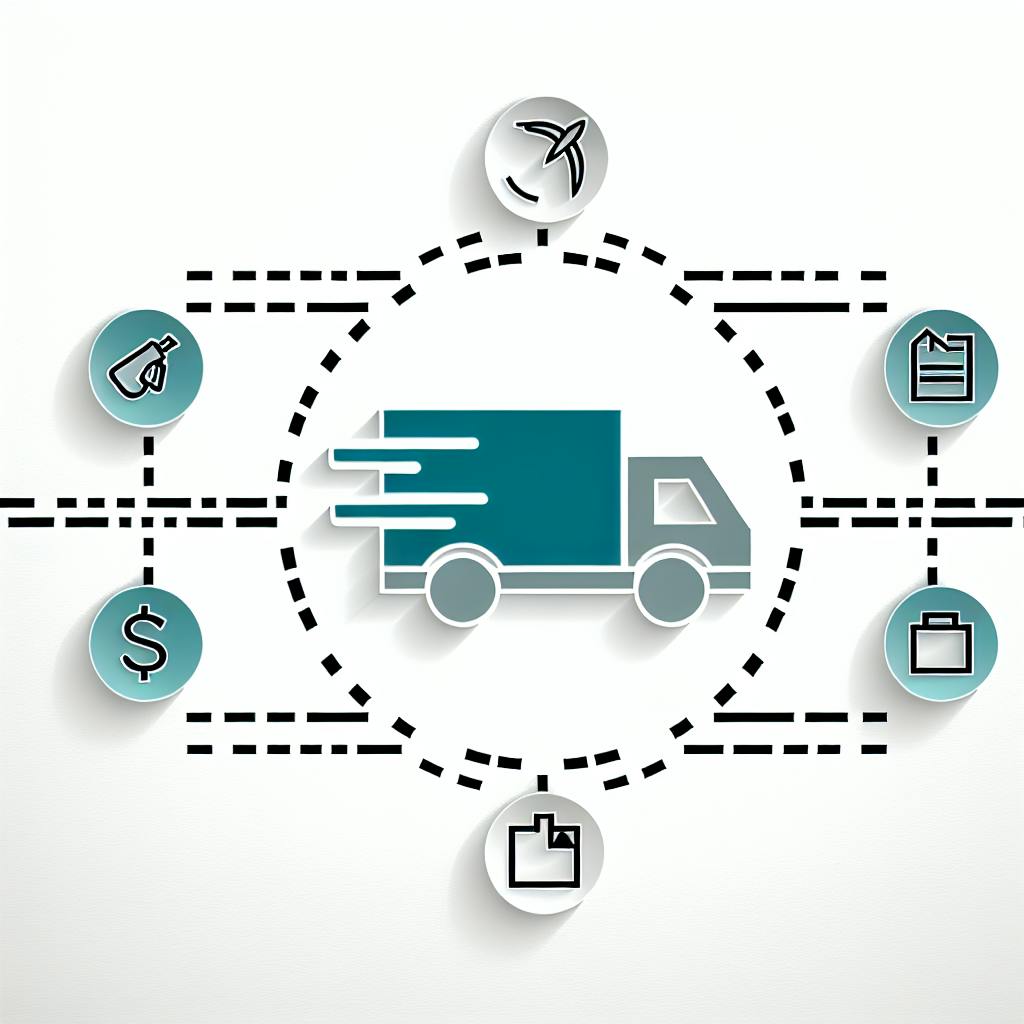As a meal prep service, ensuring PCI compliance is crucial to protect your customers' sensitive payment information and maintain a reliable business reputation. PCI compliance helps:
- Safeguard customers' debit and credit card data
- Avoid costly penalties, fines, and legal liabilities
- Maintain customer trust and confidence
To achieve PCI compliance in 2024, follow this checklist:
-
Set Up and Maintain Firewalls
- Restrict incoming and outgoing traffic
- Regularly review and update firewall rules
-
Create Unique Passwords
- Avoid default or weak passwords
- Implement a password management policy
-
Secure Stored Payment Data
- Use encryption to protect stored data
- Implement access controls
-
Encrypt Data Transmissions
- Use secure protocols like TLS or SSL
- Regularly update encryption protocols
-
Use Antivirus Software
- Install antivirus software on all systems
- Regularly update and scan for malware
-
Maintain Secure Systems
- Identify and address vulnerabilities
- Regularly review and update system security
-
Restrict Data Access
- Implement access controls
- Regularly review and update permissions
-
Assign User IDs
- Assign unique IDs to each user
- Regularly review and update user permissions
-
Limit Physical Data Access
- Implement physical access controls
- Regularly review and update access permissions
- Monitor Networks
- Use monitoring tools and protocols
- Regularly review and update monitoring protocols
- Test Security Systems
- Regularly test security systems
- Conduct vulnerability scans and penetration tests
- Document Policies and Train Staff
- Implement comprehensive security policies
- Regularly train staff on PCI compliance
Failure to comply with PCI DSS can lead to severe consequences, including financial losses, reputational damage, and legal liabilities. Prioritize PCI compliance to ensure the security and integrity of your customers' data.
Determine Your PCI Compliance Level
As a meal prep service, it's crucial to determine your PCI compliance level to ensure you're meeting the necessary security standards for processing, transmitting, and storing credit and debit card data.
What Determines Your PCI Compliance Level?
Your PCI compliance level is determined by the number of transactions your business processes annually. Here's a breakdown of the levels:
| PCI Compliance Level | Transaction Volume |
|---|---|
| Level 1 | Over 6 million transactions |
| Level 2 | 1 million to 6 million transactions |
| Level 3 | 20,000 to 1 million transactions |
| Level 4 | Less than 20,000 transactions |
Why Is It Important to Determine Your PCI Compliance Level?
Determining your PCI compliance level helps you understand the level of security measures you need to implement to protect your customers' sensitive information. The higher the number of transactions, the higher the level of compliance required. This is because Level 1 merchants need to ensure they're well-protected from threats due to their high transaction volume.
By determining your PCI compliance level, you can take the necessary steps to implement the required security measures, reduce the risk of data breaches, and maintain the trust and confidence of your customers.
2024 PCI Compliance Checklist
As a meal prep service, achieving PCI DSS compliance is crucial to ensure the security of your customers' sensitive information. Here is a detailed checklist of the 12 key PCI DSS requirements to help you navigate the process:
Set Up and Maintain Firewalls
Firewalls protect against unauthorized access to cardholder data. Ensure that your firewalls:
- Restrict incoming and outgoing traffic
- Have a process in place to regularly review and update firewall rules
Create Unique Passwords
Use strong, unique passwords for all system accounts. Ensure that you:
- Avoid default or weak passwords
- Have a password management policy in place to regularly update and rotate passwords
Secure Stored Payment Data
Store payment information securely by:
- Using encryption to protect stored payment data
- Implementing access controls to restrict access to sensitive information
Encrypt Data Transmissions
Encrypt data transmissions to prevent interception and unauthorized access to cardholder data. Ensure that you:
- Use secure protocols such as TLS or SSL
- Regularly review and update encryption protocols
Use Antivirus Software
Regularly update and maintain antivirus software to prevent malware and virus attacks. Ensure that you:
- Install antivirus software on all systems
- Regularly update and scan for malware
Maintain Secure Systems
Regularly patch and update your systems to maintain security. Ensure that you:
- Identify and address vulnerabilities
- Have a process in place to regularly review and update system security
Restrict Data Access
Restrict access to sensitive information by:
- Implementing access controls to restrict access to cardholder data
- Regularly reviewing and updating access permissions
Assign User IDs
Assign unique user IDs to track and monitor access to sensitive information. Ensure that you:
- Assign unique IDs to each user with system access
- Regularly review and update user permissions
Limit Physical Data Access
Limit physical access to hardware and data storage areas by:
- Implementing physical access controls such as locks and surveillance cameras
- Regularly reviewing and updating access permissions
Monitor Networks
Monitor networks to detect and prevent unauthorized access to cardholder data. Ensure that you:
- Have monitoring tools and protocols in place to track access and changes to cardholder data
- Regularly review and update monitoring protocols
Test Security Systems
Regularly test security systems to identify and address vulnerabilities. Ensure that you:
- Have a process in place to regularly test security systems
- Conduct vulnerability scans and penetration tests
Document Policies and Train Staff
Document policies and train staff to ensure that all employees understand their roles and responsibilities in maintaining PCI compliance. Ensure that you:
- Have comprehensive security policies in place
- Regularly train and update staff on PCI compliance requirements
By following this checklist, you can ensure that your meal prep service is meeting the necessary security standards for processing, transmitting, and storing credit and debit card data. Remember to regularly review and update your PCI compliance processes to ensure ongoing security and compliance.
Risks of Non-Compliance
As a meal prep service, failing to maintain PCI compliance can have severe consequences. Non-compliance can lead to financial losses, reputational damage, and legal liabilities.
Financial Consequences
| Risk | Description |
|---|---|
| Financial Penalties | Hefty fines, ranging from $5,000 to $100,000 per month, depending on the severity of the breach. |
| Data Breach Costs | Average cost of a data breach is around $3.92 million, including costs associated with notification, remediation, and legal fees. |
Reputational Damage
- Loss of customer trust and confidence, causing irreparable damage to your reputation.
- Decline in sales, customer loyalty, and ultimately, business failure.
Legal Liabilities
- Legal action from customers, banks, and credit card companies.
- Liability for damages, legal fees, and other expenses associated with the breach.
Business Consequences
- In extreme cases, non-compliance can lead to the loss of your business.
- Prohibition from processing credit card transactions, effectively shutting down your business.
It is essential to take PCI compliance seriously and invest in the necessary measures to protect your customers' sensitive information. By following the 2024 PCI Compliance Checklist, you can minimize the risks associated with non-compliance and ensure the security and integrity of your customers' data.
sbb-itb-3666cb4
Costs of PCI Compliance
As a meal prep service, achieving and maintaining PCI compliance comes with certain costs. These expenses can vary depending on the size and needs of your business. Understanding these costs is essential to budgeting and planning for PCI compliance.
Annual Compliance Fees
PCI Compliance Fee Range
| Fee Type | Cost |
|---|---|
| Annual Compliance Fee | $79 to $120 per year |
These fees are charged by your payment processor to cover the costs of their services and assistance in helping you become PCI compliant.
Non-Compliance Fees
Non-Compliance Fee Range
| Fee Type | Cost |
|---|---|
| Non-Compliance Fee | $10 to $100 per month |
Failure to comply with PCI DSS can result in non-compliance fees. These fees are essentially penalties for not completing your PCI compliance requirements. By taking the necessary steps to become PCI compliant, you can avoid these unnecessary charges.
It is essential to review your processing statements for PCI non-compliance fees and ensure you are PCI compliant to avoid additional charges. Additionally, if you feel you are being overcharged or underserviced, ask about your PCI compliance fee and negotiate a better deal.
By understanding the costs associated with PCI compliance, you can better plan and budget for the necessary measures to protect your customers' sensitive information.
Tools for PCI Compliance
Meal prep services can use various tools to simplify PCI compliance management. These solutions offer features like on-demand scanning, breach coverage, and vulnerability assessment, making it easier to maintain compliance.
On-Demand Scanning
On-demand scanning tools allow you to conduct vulnerability scans and penetration tests at your convenience. This feature helps identify potential security weaknesses, enabling you to address them promptly and reduce the risk of non-compliance.
Breach Coverage
Breach coverage is essential in case of a security breach. It helps mitigate the financial impact of the incident. Look for tools that offer breach coverage as part of their PCI compliance solutions.
Vulnerability Assessment
Vulnerability assessment tools help identify potential security vulnerabilities in your systems and applications. By regularly assessing your systems, you can detect and address weaknesses before they can be exploited by attackers.
Some popular tools for PCI compliance include:
| Tool | Features |
|---|---|
| PCI Pal | On-demand scanning, breach coverage, vulnerability assessment |
| SecurityMetrics | Vulnerability scanning, penetration testing, compliance reporting |
| Trustwave | On-demand scanning, breach coverage, vulnerability assessment, compliance reporting |
When selecting a tool for PCI compliance, consider the following factors:
- Ease of use: Choose a tool with an intuitive interface that simplifies the compliance process.
- Features: Ensure the tool offers a range of features, including on-demand scanning, breach coverage, and vulnerability assessment.
- Cost: Evaluate the cost of the tool and ensure it fits within your budget.
- Customer support: Opt for a tool with reliable customer support to help you navigate any compliance issues.
By using these tools, meal prep services can effectively manage PCI compliance and reduce the risk of non-compliance fees and penalties.
Conclusion
In conclusion, meal prep services must prioritize PCI compliance to ensure the security of their customers' payment information and maintain a reliable business reputation. By following the checklist outlined in this article, meal prep services can effectively manage PCI compliance and reduce the risk of non-compliance fees and penalties.
Why PCI Compliance Matters
PCI compliance is crucial for meal prep services because it:
- Protects customers' sensitive payment information
- Reduces the risk of financial losses and reputational damage
- Helps maintain trust and confidence with customers
Ongoing Compliance
PCI compliance is an ongoing process that requires regular monitoring and updates to maintain a secure environment. By prioritizing PCI compliance, meal prep services can:
- Build trust with their customers
- Expand their market presence
- Drive business growth
Remember, PCI compliance is essential for meal prep services to ensure the security and integrity of their customers' data. By following the guidelines outlined in this article, meal prep services can effectively manage PCI compliance and reduce the risk of non-compliance fees and penalties.


